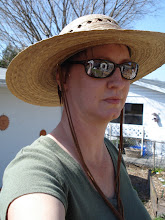A little over a year ago, we bought a Worm Composting Bin from Carl and Bernie Moro of Our Vital Earth. Bernie and Carl were guest speakers at one of our Daylily Club meetings. They brought their Can O' Worm systems, along with samples of their worm tea and worm castings. We were very interested in reducing our kitchen waste, and composting more effectively than with the outside compost pile (which, in our yard, really is just a salad bar for wayward possums.) Bernie and Carl told us about how they went to Australia to learn more about Vermiculture (which is the growing of worms) and Vermicomposting. The containers are made from recycled battery cases, and are ubiquitous in Australian households.
We brought our composter home and set it up. It was really easy. It came with worms and starter bedding and a DVD that I've since misplaced and had to order another one. You start with just one tray, fill it with kitchen scraps, and watch them go to town. As the months go on, you add a tray until you get all of them going. The bottom of the composter is a water reservoir, with a spigot on it. Once a week, I drain off the liquid before I feed the worms. They will eat about 6 - 7 pounds of vegetative kitchen scraps per week. I went to the thrift store and bought an old ice bucket to use as a kitchen scrap collector. There are prettier commercial counter top compost buckets, but I wanted to reuse something. I've got my eye on a nice bamboo one in the Gaiam catalog....
The worms get a load of scraps every week, and eat almost all of it. There are a few things that we've learned about what worms like and don't like. They will eat almost everything, but they don't like corn husks or avocado peels. They will glom onto the inside of an avocado shell and eat all the green stuff out, but they won't actually consume the peel. You can pick up a peel and it will be packed full of worms. They don't get to celery root , melon and squash seeds fast enough, because I've had several baby celery, melon and squash plants trying valiantly to grow in the dark of the bin. They like egg shells, but they must be crushed really fine. Tea leaves are a favorite. We go through a lot of tea in a week, and my Facebook friend Ann, who runs a tea shop, will give me her tea leaves from the store. Starbucks always has bags of coffee grounds you can get for freesies, too.
We get about 3 quarts of worm tea a week. Worm tea is really liquid body waste. Worms can't urinate, so by pouring water over them every week, the waste gets washed off their bodies and collects in the bottom level of the bin. Bernie calls it the "pool in the basement of the worm condo." The castings are the solid body waste of the worms, and they tend to leave that behind as they move around. The lowest tray has the highest concentration of compost, so that's the tray we harvest from every month. Worm castings are an excellent organic fertilizer, and the worm tea is also a good fungicide in addition to being a fertilizer. I know I can tell a huge difference in our daylilies just from using the worm castings and worm tea. They are all giving us our best season ever this year.
You don't have to use the commercial bin like we have, but it sure is easier than a homemade one. We made homemade ones at one of our daylily club meetings a few years ago, and it was much more of a hassle than this system.
I really like knowing that I'm putting less waste in the landfills, attracting fewer varmints to our yard, and using no chemicals fertilizers to leach into the water table.
Here is a link to a slide show of how I harvest the castings every month.
Friday, May 7, 2010
Subscribe to:
Post Comments (Atom)


Where do you normally keep the bin?
ReplyDeleteMost people keep their bins in a garage (which we don't have) or carport (which we don't have) Worms don't like temps above 90, so I keep it in the laundry room in the summer, and on the lanai the rest of the year. That makes it hard to maneuver (thank god for Jay) because he has to carry it out and back in for me every month. If we had a screened in porch without glass, I think they'd be okay. I do wish we had a better solution for that.
ReplyDeleteI take it there's no smell...
ReplyDeleteNope, not from the worms. Now the ice bucket I keep the food scraps in can get pretty ripe, but that's my own fault for not taking them out more often than once a week. But the worms and the unit itself don't have any smell... mostly it smells like dirt. Occasionally the worm tea is strong, but that's mostly when I've gone more than a week without draining and re-watering it.
ReplyDelete